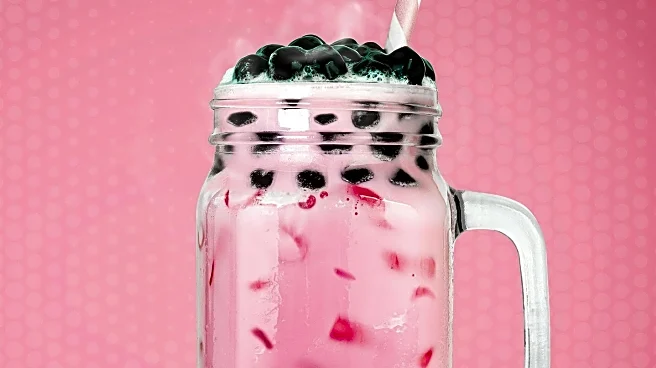What's Happening?
Consumer Reports has conducted safety tests on boba pearls, a popular component of bubble tea, revealing the presence of lead in samples from major chains and packaged products. The pearls, made from cassava, a root vegetable known to absorb lead and other heavy metals from soil, were tested from Gong Cha, Kung Fu Tea, Trader Joe’s, and Wu Fu Yuan. All samples contained lead, prompting Consumer Reports to advise against making bubble tea a daily habit. While the detected lead levels were not excessively high, the presence of lead in all tested products is concerning, especially for children and pregnant individuals, as no amount of lead is considered safe.
Why It's Important?
The findings from Consumer Reports highlight a significant health concern associated with the consumption of bubble tea, particularly due to the presence of lead in boba pearls. Lead exposure is a serious issue, with potential health risks including developmental problems in children and complications during pregnancy. The report underscores the importance of monitoring and regulating food products for heavy metals, which can accumulate in the body over time. This revelation may impact consumer choices, leading to a shift towards safer alternatives and increased scrutiny of food safety standards in the beverage industry.
What's Next?
Following the report, Trader Joe’s has discontinued its Instant Boba Kit, indicating a proactive response to the findings. Wu Fu Yuan has committed to enhancing its quality control measures. However, Kung Fu Tea and Gong Cha have not yet responded to the report. The broader industry may face increased pressure to address these safety concerns, potentially leading to stricter regulations and testing protocols for products containing cassava. Consumers are advised to limit their intake of bubble tea and similar products, while maintaining a diverse diet to mitigate heavy metal exposure.
Beyond the Headlines
The issue of lead in boba pearls raises broader questions about food safety and the environmental factors contributing to heavy metal contamination. Cassava’s ability to absorb lead from soil highlights the need for sustainable agricultural practices and soil management to prevent contamination. This situation also reflects the challenges in balancing cultural food trends with health considerations, as bubble tea continues to gain popularity globally. The report may prompt further research into other food products that could be affected by similar issues.










